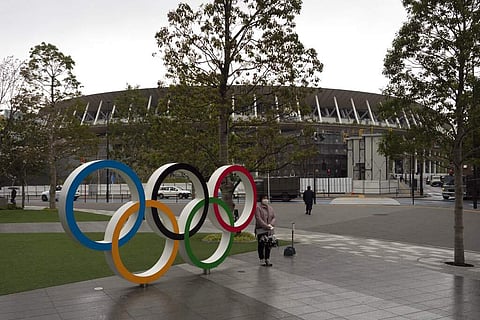
- LIFESTYLE
- FASHION
- FOOD
- ENTERTAINMENT
- EVENTS
- CULTURE
- VIDEOS
- WEB STORIES
- GALLERIES
- GADGETS
- CAR & BIKE
- SOCIETY
- TRAVEL
- NORTH EAST
- INDULGE CONNECT

TOKYO (AP): The Tokyo Olympics are going to happen — but almost surely in 2021 rather than in four months as planned.
This became clear after the IOC on Sunday announced it was considering a postponement. Major Olympic nations like Canada and Australia have added pressure by saying they will not go if the games are staged this year.
International Olympic Committee President Thomas Bach sent a letter to athletes explaining the decision and why it might take so long, while also acknowledging the extended timeline might not be popular.
“I know that this unprecedented situation leaves many of your questions open,” he wrote. “I also know that this rational approach may not be in line with the emotions many of you have to go through.”
The IOC's move seemed inevitable for a week with pressure mounting from all quarters — athletes, sponsors, broadcasters and more than 200 national Olympic committees, and international sports federations.
Shortly after Bach's statement, the Canadian Olympic Committee said it won't send teams to the Olympics unless the games are postponed by a year. Australia issued a statement saying it was advising its athletes to prepare for an Olympics in 2021.
The Australian committee's executive board agreed unanimously that “an Australian Team could not be assembled in the changing circumstances at home and abroad."
World Athletics President Seb Coe sent a letter to Bach saying that holding the Olympics in July “is neither feasible nor desirable.”
He outlined a number of reasons, including competitive fairness, the likelihood athletes would overtrain if given a compressed schedule and the uncertainty caused by orders in many countries barring people from gyms and other workout venues.
National Olympic committees in Brazil and Slovenia had also called for a postponement until 2021. Norway’s Olympic body said it did not want athletes going to Tokyo until the global health crisis is under control.
The United States governing bodies of swimming and track — two of the three top-tier Summer Games sports — had called on their national Olympic officials to push for a postponement.
Japan's politicians fell in line quickly on Monday as they awakened to Bach's move.
Japan’s Prime Minister Shinzo Abe, speaking at a parliamentary session, said a postponement of the Tokyo Olympics would be unavoidable if the games cannot be held in a complete way because of the coronavirus pandemic.
“If it is difficult to hold (the Games) in a complete way, a decision of postponement would be unavoidable,” he said.
Abe said he hoped the IOC would make a decision early if it is postponed because the process would involve a lot of work and should start as soon as possible.
Tokyo Governor Yurko Koike echoed Abe.
“The IOC will fully examine what to do over the next four weeks, and in that process, that word (postponement) may be included," she said.
The IOC holds most of the cards in any rescheduling, spelt out in a Host City Contract signed in 2013 between the IOC, the Japanese Olympic Committee and the city of Tokyo.
Japan is officially spending $12.6 billion to organise the Olympics, but a national audit put the figure at more than twice that much.
The bill is sure to increase with any postponement, and the vast majority of the spending if from the public treasury.
The IOC has a reserve fund of about $2 billion to tide itself over and also has insurance against postponement or cancellation.
“The public is expecting and supports postponement, so it won't be a big deal," Jeff Kingston, who studies Japanese politics at Temple University in Tokyo, said in an email.
“People are way more worried about the economic consequences and their jobs and if the number of cases ramps."
Former IOC marketing director Michael Payne said the delay might work to the advantage of the IOC and Japan.
“What better platform is there going to be than the Olympic Games when the world has pulled through the virus,” Payne said in an interview Sunday, just before the IOC announcement.
“You've got a dynamic that will be even more powerful for Japan and the rest of the world. But you are going to have a tough road getting there.”
The Olympic torch arrived Friday in northern Japan. The torch relay it set to begin on Thursday from that area but is in doubt. On Sunday, thousands crowed one northern city to view the flame.
Spectators have been asked to show restraint, and there's speculation the relay could be delayed. Organisers on Monday said a decision on whether to proceed with the relay could wait.
As of Sunday, Japan had 1,719 confirmed cases of the virus, including 712 from a cruise ship, with 43 deaths.
While Japan has so far managed to slow the acceleration of the outbreak, experts say they have found a growing number of clusters in urban areas with untraceable infections.
As coronavirus pandemic gets bigger, so do the questions: Will Tokyo Olympics 2020 open?
Olympic torch relay through Greece snuffed out over coronavirus fears
Tokyo hosts Olympic torch relay rehearsal despite looming spectre of coronavirus epidemic
Disgraced producer Harvey Weinstein reportedly tests positive for COVID-19 in jail
Placido Domingo tests positive for coronavirus, says it's his 'moral duty' to let fans know
Pop star Rihanna makes $5 million emergency donation to fight coronavirus pandemic
Saif Ali Khan gets busy in home garden with son Taimur on Sunday's Janata Curfew
Reports: Kanika Kapoor stayed in same hotel as visiting South African cricket team in Lucknow
Why did Twitter remove Rajinikanth's post on the Janata Curfew and social distancing?